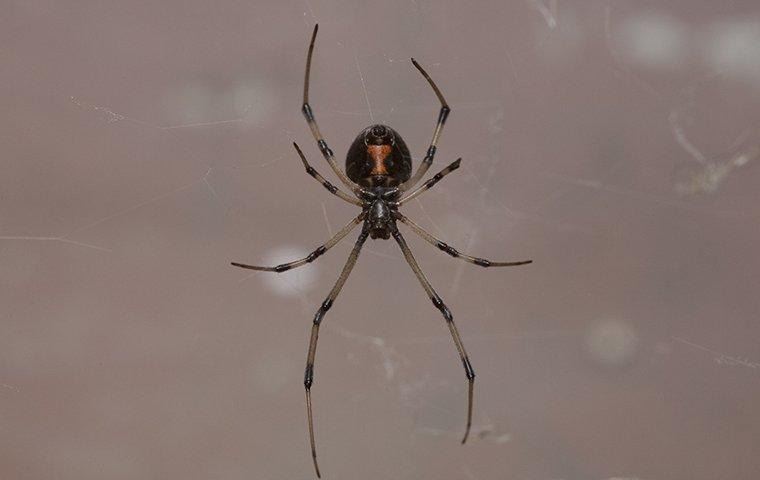
How To Identify And Get Rid Of Dangerous Spiders In Your Mooresville Home
It is likely you're aware that all spiders are not the same. Many of the spiders that enter Mooresville homes are harmless. In fact, some are not capable of biting you. They have weak fangs that can't penetrate your skin. These harmless spiders are just a nuisance. They surprise you in unexpected places, scramble across walls, and create unsightly webs. But there are two kinds of spiders you should know a little something about because they can present a danger to you and your family. Join us today as we look at dangerous spiders in Mooresville, why they get into your home, and most importantly, how to get rid of them. If you have urgent questions, remember that we're here to answer them.
You can call us to speak with one of our helpful service professionals over the phone. We're your Mooresville pest experts.

The Two Types Of Dangerous Spiders Found In Mooresville
Can you name two dangerous spiders? We bet you can. They are famous—or should we say infamous. They are the black widow and brown recluse spider. While all spiders have venom, these two have potent venom capable of causing harm. Each does this in its own way. We'll talk about this in a moment. First, let's quickly discuss how you can identify these spiders and a few tips to help you prevent them from invading your home.
Black Widow Spiders: These are bulbous spiders with a black and shiny exterior and a red hourglass mark on the underside of the abdomen. They prefer to live outdoors but will enter homes when a path is presented. Pest proofing is critical for the prevention of a black widow infestation. It is also helpful to remove hiding places near your home and reduce pest populations. If a black widow is unable to find a place to establish a web and catch prey, it may decide to choose another yard.
Brown Recluse Spiders: These are small brown spiders that are visibly hairless. If you're able to view the spider closely, or you have good eyes, you'll notice a dark brown violin mark on its back. These spiders can live outdoors but they do surprisingly well indoors in an adequate habitat. All a recluse spider needs is a food source. Keeping pests out of your home can help deter brown recluses from living with you. Along with this, check used furniture closely before bringing items into your home; brown recluse spiders are known to hitchhike from one structure to another inside furniture and other items.

Now that you know a bit about venomous spiders in Mooresville, let's turn our attention to spider bite prevention and treatment. We'll also discuss how likely you are to have one of these two spiders bite you. Our answer may surprise you.
The Symptoms Of A Dangerous Spider's Bite
Spider bites are often unpleasant. A bite may feel like a pin prick or a bee sting. In most cases, no symptoms follow. You'll just have an itchy wound. The itchiness is caused by an allergic reaction to spider saliva and venom. When a venomous spider bites you, your body may not have the strength to combat the venom.
Black Widow Spider Bites: The symptoms of a black widow bite vary depending on how much, or whether or not, the spider injects venom. It is possible to get a dry bite, which will only result in localized pain. An injection of venom will lead to medical symptoms that resemble the flu at first. It is critical to seek medical attention if you have these symptoms as they can lead to more severe and life-threatening symptoms, such as difficulty breathing, muscle stiffness, weakness, and tremors.
Brown Recluse Spider Bites: The symptoms of a brown recluse spider bite will vary, depending on your body's ability to fight the venom. Brown recluses are known for their necrotic venom that can cause disfiguring wounds, but most wounds don't have a spreading necrosis. But we recommend having a physician monitor the spread as it can occur subdermally (under the skin).
How do you prevent a venomous spider bite?
- Wear gloves when moving objects in your yard, such as wood debris and branches.
- Always wear something on your feet when walking around outdoors.
- Use a flashlight and examine crawlspaces before entering.
- Look for webs that have strong strands. Black widows make these webs.
- Shake footwear, towels, clothing, and other items before use.
- Remove skirting on beds and keep blankets from touching the floor.
- Pull beds away from walls.
- Avoid having beds underneath ceiling vents if possible.
- Be cautious when entering storage rooms or when opening boxes that are taken out of storage.
As you consider bite prevention, we want you to also consider how likely it is for a venomous spider to bite you. While brown recluse spiders have the word "recluse" in their name, both of these spiders are reclusive. They hide in secluded and undisturbed spaces. Black widows typically bite when their webs are disturbed. Brown recluse spiders bite when their numbers rise and they have to explore further and compete more for food resources in your home. We don't recommend waiting for either of these spiders to grow a population. Contact Lake Norman Home Services for pest control in Mooresville at the first sign of a venomous spider—just in case.
Why Dangerous Spiders Would Invade Your Home
We touched on this, but it bears further explanation. There is a strong link between spiders and general pest problems. Spiders live where their food resources are found. If you're tired of seeing spiders everywhere, and you don't want to ever see a venomous spider, it helps to consider the food they eat.
Flies Attract Spiders
Flying insects are a treat for all spiders that create webs, including black widow spiders. If you have any conditions on your property that invite flying insects, you may also invite a black widow spider infestation.
- Light is an attractant for insects. Keep lights off if possible or install bulbs that only come on when motion is detected.
- The scent of decaying organic matter attracts flies. Wash trash receptacles that have an odor and keep your receptacles away from exterior doors so flies don't zip into your home when you open the door.
- Address aphids by managing your plants and using yellow sticky traps. Aphids create honeydew, which is a tasty food source for other insects.
- Address flowering weeds. Nectar is a food source many insects enjoy—not just bees.
Crawling Insects Attract Spiders
Both black widow and brown recluse spiders eat crawling insects and multi-legged bugs. Address the conditions that promote ground pest activity and you'll have less trouble with venomous spiders.
- Crawling insects are also attracted to light. Consider altering ground lighting.
- Mix compost heaps properly to avoid attracting these pests.
- Remove leaves and organic debris which are an ideal habitat.
Hiding Places Bring Spiders Close
When venomous spiders can hide next to your foundation walls, you have a greater chance of having an indoor infestation. They'll hide in brush piles, stacked wood, junk piles, cinder blocks, piles of stones, toys, and more.
- Remove yard clutter.
- Stay on top of yard work, such as raking leaves.
- Trim vegetation to make your landscaping thinner.
Moist Conditions Provide An Ideal Habitat
Bugs are attracted to damp conditions because water is a catalyst for rot. When you keep your perimeter and landscaping dry, you resist pests that provide a food source for spiders.
- Clear out any debris in your gutters.
- Make sure rainwater is draining down and away from your exterior.
- Repair exterior plumbing issues.
- Remove weeds, unwanted grass, and organic debris from your landscaping.
- Trim your plants.
Entry Points Allow Spiders In
Spiders get into your home because they can. If you patch holes, apply pest-proofing, and seal gaps, spiders may not move from outdoor environments to indoor spaces.
- Use a caulking gun to apply seals around window frames and door frames.
- Fill in small structural voids and apply seals around foundation penetrations using expanding foam.
- Replace worn-out door sweeps or weatherstripping around your exterior doors.
- Fix rotting wood or patch wood holes for a temporary fix.
Ideal Indoor Conditions Promote Infestation
When venomous spiders enter your home and find few pests to feed on, they'll likely go back outdoors. It is as simple as that. Vigilant indoor pest control is essential for spider management.
- Clean your floors, counters, and shelves.
- Clean your bathroom.
- Protect your food.
- Use your bathroom vent when taking a shower or bath to evacuate the moisture.
- Address leaking faucets and other plumbing issues in your home.
If you use these tips, you can reduce the number of pests in your yard and inside your home. When you do this, you'll also reduce the number of spiders. If you want to get rid of spiders in your home or have the best protection against spider infestations, ongoing professional pest control service is a big help.
The Safest Way To Get Rid Of Dangerous Spiders Around Your Home
All-natural spider control takes effort, and many residents turn to pest control materials to address spider problems. Unfortunately, these products have the potential to cause more harm than good. If you want to keep spiders out by using control materials, it is best to hire a licensed home pest control professional. A pest management professional will select appropriate materials and apply them according to strict safety protocols. If you're in Mooresville, contact Lake Norman Home Services for service plans expertly crafted to provide the best mixture of control methods and materials to address the pests that concern you most. Our 12-step preventative pest control process gets results and is designed to go easy on your wallet.
Connect with us today to learn more.


Customer Reviews
-
“Lake Norman pest control does a wonderful job all around and even explained the safety concerns I had of the products for my new baby and dog.”- Lauren G.
-
“Lake Norman Pest Control has always been consistent with their service quality and more than fair with pricing.”- Michael C.
-
“He called me after the appointment and gave me a summary of the service and he made some additional recommendations.”- Leslie Z.
-
Jake promptly arrived and asked what issues we were having and quickly began applying treatment. He was professional and thorough. Very pleased with the service today.- Lisa C.
-
“Jake promptly arrived and asked what issues we were having and quickly began applying treatment.”- Lisa C.
-
“Lake Norman always does a great job in communicating and shows up at their committed times.”- Mike C.
-
“Michael has beHe and every representative we’ve worked with from this company have been very kind and good at listening to our needs. en super helpful! He's prompt, thorough, and responsive to all of our questions.”- Kimberly G.
-
“Our technician, Jake, has been very helpful. He has been on time and responsive to all my questions.”- Laurence P.


Why Choose Lake Norman Home Services?
-
4.9 Star Google Review RatingLake Norman Home Services is proud to have thousands of Google reviews with an average rating of 4.9 stars!
-
Residential & Commercial ServiceResidential and commercial clients in Mooresville and beyond can attest - Lake Norman provides only the very best in home services.
-
A+ Rating with Better Business BureauDecades of continuous BBB accreditation.
-
The Best & Highest ReviewsBBB A+ Rated and 4.8 or higher on Google and Facebook for the highest rated local company in the area.